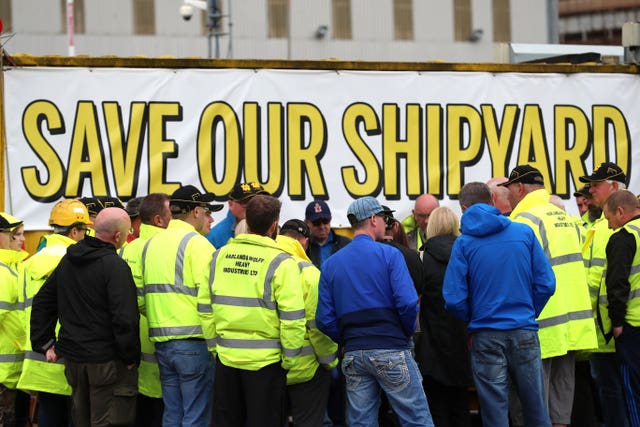
A closure-threatened Belfast shipyard famed for building the Titanic has been saved.
Harland and Wolff has been bought for £6 million by InfraStrata, a London-based company that specialises in energy infrastructure projects.
All workers at the plant who did not take voluntary redundancy when the yard went into administration – 79 in total – will now keep their jobs.
Infrastrata said it planned to increase the size of the workforce by several hundred over the next five years.
Chief executive John Wood said: “Harland and Wolff is a landmark asset and its reputation as one of the finest multipurpose fabrication facilities in Europe is testament to its highly skilled team in Belfast.”
Workers have occupied the site since the business went into administration in the summer, undertaking a high-profile campaign to save their jobs.
On Tuesday morning there was a celebratory mood at the gates of the yard as workers changed the wording of their Save Our Shipyard banner to We Saved Our Shipyard.
Steel worker and employee representative Joe Passmore said the workers were “absolutely delighted”.
He said they hope to get back to work as early as Thursday this week.
“It vindicates everything that we believed in from the start,” he said. “We know what the future could be here, we know the skills that exist here, and we know we can make a success of this, we always did, that’s why we took the stand in the first place. We have been vindicated.”
Mr Wood told the PA news agency later that he is “hopeful” the workers can get back to work this week.
“Whether we can get there or not we don’t know but we are still hopeful to make that happen,” he said.
The shipyard, whose famous yellow cranes Samson and Goliath dominate the east Belfast skyline, employed more than 30,000 people during the city’s industrial heyday but the workforce numbered only around 125 when the company went under.

The business had diversified away from shipbuilding in the last two decades, shifting to work on wind energy and marine engineering projects.
Known around the world for building the doomed White Star liner Titanic, which sank on her maiden transatlantic voyage in 1912 after striking an iceberg, Harland and Wolff was one of the UK’s key industrial producers during the Second World War, supplying almost 150 warships.
Administrators BDO Northern Ireland confirmed they had entered into heads of terms with InfraStrata with the intent of completing the sale in the near future.
A spokesman for BDO said: “The agreed terms of sale will include the transfer of the remaining employees on their existing terms and conditions to the purchaser upon completion.
“In the interim, it is intended that the remaining employees will be able to return to work in the coming days to facilitate the remaining steps required for the completion of a sale.
“This is a very positive step towards securing a sale of the shipyard and protecting and safeguarding the employment of the workforce.”
Northern Ireland Secretary Julian Smith welcomed the deal.
“I am delighted by the news that InfraStrata have purchased the Harland and Wolff shipyard and retained the skills and experience of the existing workforce,” he said.
“I firmly believe that the shipyard has a promising future and that InfraStrata’s plans present an exciting opportunity for both Belfast and Northern Ireland’s manufacturing and energy sectors.”
Trade unions Unite and GMB hailed the workforce’s role in securing the yard’s future.
Susan Fitzgerald, regional co-ordinating officer with Unite, said: “From July 29th, when workers were faced with the imminent collapse of the yard, they were determined not only to save their own jobs but to safeguard Northern Ireland’s skillbase going forward. Their nine-week occupation will be remembered by future generations of workers as evidence of the power of collective action.”
Denise Walker, senior organiser with GMB, said workers “took control of the situation and of their workplace”.
“In so doing they have ensured that Harland and Wolff will not only continue but will be in a position to expand and fulfil its potential as a lynchpin of Northern Ireland’s economy,” she said.
Workers are now set to be involved in works on InfraStrata’s proposed underground gas storage facility at Islandmagee in Co Antrim.
They will be involved in the steel fabrication work required for the project in underground salt caves.
Mr Wood added: “This acquisition is a function of deep operational synergies between the various business segments of the company, with Harland and Wolff underpinning the construction economics of the Islandmagee gas storage project and other future projects.
“We are delighted to be able to retain 100% of personnel who did not opt to take voluntary redundancy earlier this year.
“Our Islandmagee gas storage project will benefit greatly from their expertise in the energy sector, both technically and economically, and we look forward to growing the workforce significantly in the coming years.
“While our core priority will be to deliver our flagship project in Islandmagee, we believe there are opportunities to welcome potential new clients due to the diverse skill set at the facility.
“This acquisition will clearly provide substantial advantages through vertical integration in addition to demonstrating our commitment to the Northern Irish economy, particularly in the post-Brexit era.”


Comments: Our rules
We want our comments to be a lively and valuable part of our community - a place where readers can debate and engage with the most important local issues. The ability to comment on our stories is a privilege, not a right, however, and that privilege may be withdrawn if it is abused or misused.
Please report any comments that break our rules.
Read the rules here